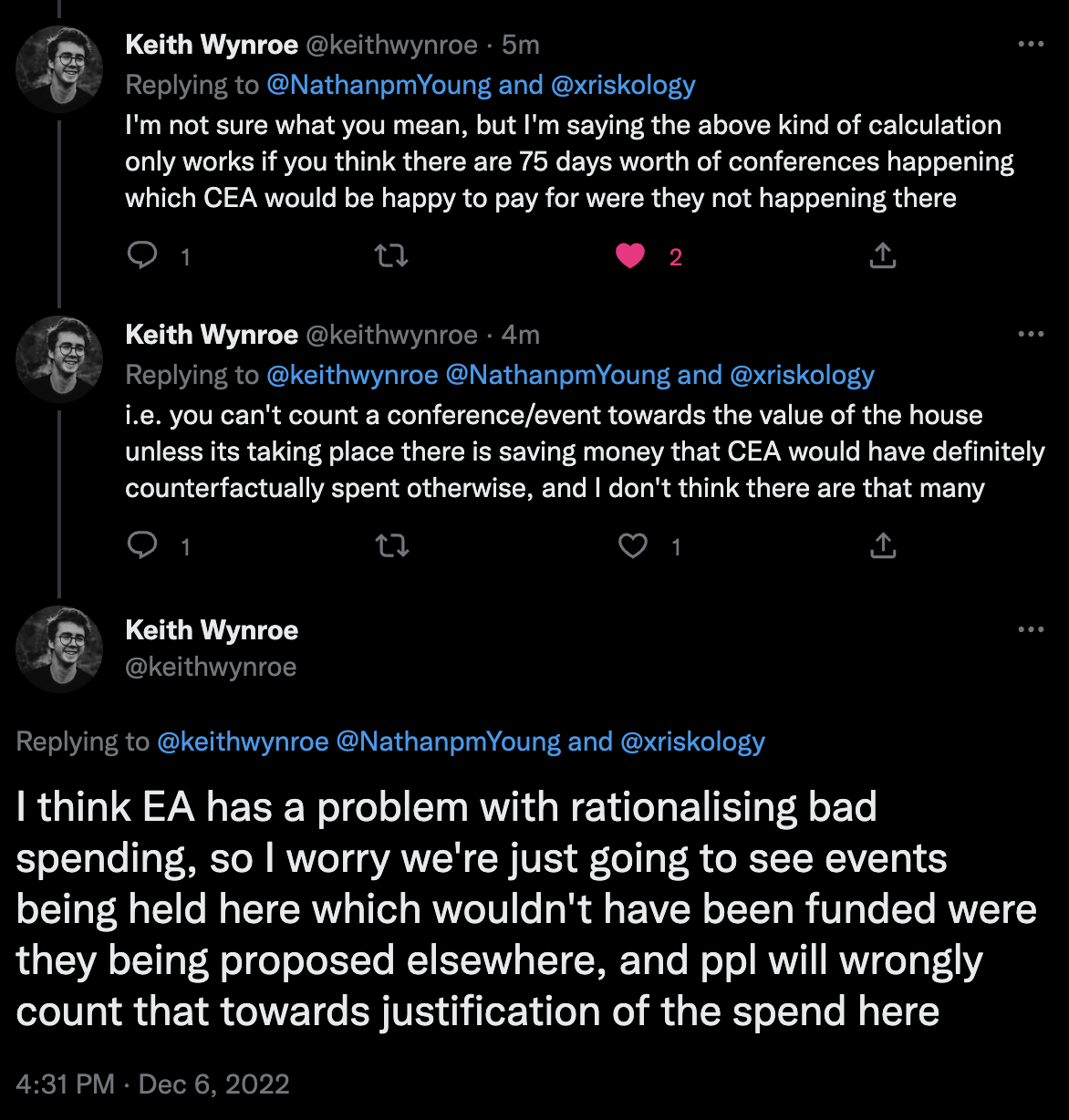Edit to add (9/1/2023): This post was written quickly and I judged things prematurely. I also regret not reaching out to Effective Ventures before posting it. Regarding my current opinion on the Abbey: I don't have anything really useful to say that isn't mentioned by others. The goal of this post was to ask a question and gather information, mostly because I was very surprised. I don't have a strong opinion on the purchase anymore and the ones I have are with high uncertainty. More thoughts in my case for transparent spending.
Yesterday morning I woke up and saw this tweet by Émile Torres: https://twitter.com/xriskology/status/1599511179738505216
I was shocked, angry and upset at first. Especially since it appears that the estate was for sale last year for 15 million pounds: https://twitter.com/RhiannonDauster/status/1599539148565934086
I'm not a big fan of Émile's writing and how they often misrepresent the EA movement. But that's not what this question is about, because they do raise a good point here: Why did CEA buy this property? My trust in CEA has been a bit shaky lately, and this doesn't help.
Apparently it was already mentioned in the New Yorker piece: https://www.newyorker.com/magazine/2022/08/15/the-reluctant-prophet-of-effective-altruism#:~:text=Last year%2C the Centre for Effective Altruism bought Wytham Abbey%2C a palatial estate near Oxford%2C built in 1480. Money%2C which no longer seemed an object%2C was increasingly being reinvested in the community itself.
"Last year, the Centre for Effective Altruism bought Wytham Abbey, a palatial estate near Oxford, built in 1480. Money, which no longer seemed an object, was increasingly being reinvested in the community itself."
For some reason I glanced over it at the time, or I just didn't realize the seriousness of it.
Upon more research, I came across this comment by Shakeel Hashim: "In April, Effective Ventures purchased Wytham Abbey and some land around it (but <1% of the 2,500 acre estate you're suggesting). Wytham is in the process of being established as a convening centre to run workshops and meetings that bring together people to think seriously about how to address important problems in the world. The vision is modelled on traditional specialist conference centres, e.g. Oberwolfach, The Rockefeller Foundation Bellagio Center or the Brocher Foundation.
The purchase was made from a large grant made specifically for this. There was no money from FTX or affiliated individuals or organizations." https://forum.effectivealtruism.org/posts/Et7oPMu6czhEd8ExW/why-you-re-not-hearing-as-much-from-ea-orgs-as-you-d-like?commentId=uRDZKw24mYe2NP4eq
I'm very relieved to hear money from individual donors wasn't used. And the <1% suggests 15 million pounds perhaps wasn't spent. Still, I'd love to hear and understand more about this project and why CEA thinks it's cost-effective. What is the EV calculation behind it?
Like the New Yorker piece points out, with more funding there has been a lot of spending within the movement itself. And that's fine, great even. This way more outreach can be done and the movement can grow. But we don't want to be too self-serving, and I'm scared too much of this thinking will lead to rationalizing lavish expenses (and I'm afraid this is already happening). There needs to be more transparency behind big expenses.
Edit to add: If this expense has been made a while back, why not announce it then?


Here's an explanation of some of the reasons it's often harmful for a community to fixate on optics, even though optics is real: https://www.lesswrong.com/posts/Js34Ez9nrDeJCTYQL/politics-is-way-too-meta
It also comes off as quite manipulative and dishonest, which puts people off. There are many people who'll respect you if you disagree with them but state your opinion plainly and clearly, without trying to hide the weird or objectionable parts of your view. There are relatively few who will respect you if they find out you tried to manipulate their opinion of you, prioritizing optics over substance.
And this seems especially harmful for EA, whose central selling point is "we're the people who try to actually do the most good, not just signal goodness or go through the motions". Most public conversations about EA optics are extremely naive on this point, treating it as a free action for EAs to spend half their time publicly hand-wringing about their reputations.
What sort of message do you think that sends to people who come to the EA Forum for the first time, interested in EA, and find the conversations dominated by reputation obsession, panicky glances at the news cycle, complicated strategies to toss first-order utility out the window for the sake of massaging outsiders' views of EA, etc.? Is that the best possible public face you could pick for EA?